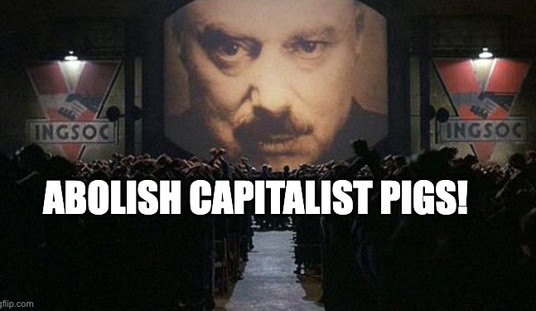In the midst of all the “false crises” that the White House worries people will fret over, another crisis got yet another deferral. In a development that should surprise no one at all, the P5+1 group allowed Iran a four-month extension over the weekend on a deadline for a deal on full transparency on its nuclear program. Not only did Iran get a four-month extension, it also got access to another $2.8 billion in badly-needed cash — assets that were being used for leverage to force Iran to comply with its obligations under the Non-Proliferation Treaty:
Iran faced Western pressure on Saturday to make concessions over its atomic activities after it and six world powers failed to meet a July 20 deadline for a deal to end the decade-old dispute but agreed to keep talking.
The countries agreed to extend the high-stakes negotiations by four months, and let Iran access another $2.8 billion of its cash frozen abroad during that period, though most sanctions on the Islamic Republic stayed in place.
Germany – one of the major powers trying to persuade Iran to curb its nuclear programme – warned that the extended talks might be the last chance for a long time to reach a peaceful solution.
Echoing the views of other envoys, a Western diplomat said there had been some progress during nearly three weeks of marathon discussions in Vienna’s 19th century Coburg palace and that gaps in positions were not “unbridgeable”.
But, the senior diplomat added: “We cannot accept that Iran stays at current levels of enrichment.”
So far, they seem to be accepting it just fine. Iranians have been at that level of enrichment for years, during which they have teased the West with promises of “reformers” ready to make deals. When deadlines arrive, they renege and claim either that they need more time, or that the P5+1 hasn’t delivered on their end of the bargain. The West extends deadlines and discusses how they can sweeten the deal.
With that incentive structure, two conclusions are unassailably true: Iran will continue to delay and renege, and the West will continue to tolerate it. The lessons of the last decade make that clear, which is why what happened over the weekend didn’t grab headlines.
The Obama administration has taken a lot of criticism for its lack of leadership and naïveté in regard to Iran. This time, though, former Obama advisers have joined the critics, Jen Rubin points out:
The bipartisan United Against a Nuclear Iran (of which Ross is a member) also blasted the president. A statement co-authored by Gary Samore, Obama’s former coordinator for arms control and weapons of mass destruction, commonly referred to as the WMD “czar” read: “To date, the economic benefits accrued to Iran are greater than what was contemplated in the [Joint Plan of Action]. While the state of the Iranian economy remains in difficulty, Iran’s economy has improved and the regime’s diplomatic isolation has lessened. So far, however, Iran has not shown a willingness to dismantle any of its uranium enrichment capabilities and it continues to research and develop missile delivery systems and advanced centrifuges.” The statement continued:
The course of the negotiations has revealed a clear gap on the most important issue — the number and type of centrifuges. With its current enrichment capacity, Iran’s breakout time to produce fissile material for a bomb remains at a few months. However, Iran has been unwilling to consider a reduction in its current capacity, and the Supreme Leader recently proclaimed that Iran seeks a much larger enrichment program. This is unacceptable. If Iran remains unwilling to dismantle its nuclear infrastructure, forgo an industrial-scale enrichment program and address the ongoing questions about the military dimensions of its nuclear program, there is little potential for a diplomatic resolution.
They therefore recommend that P5+1 group of international powers continues to insist that “Iran remains closed for business and that the uncertainty surrounding these nuclear negotiations makes the business climate in Iran far too risky for responsible businesses to return; ensure existing sanctions are enforced more aggressively; and agree on decisive sanctions that would constitute a virtual economic blockade of Iran should Iran fail to agree to an acceptable deal over the term of the extended negotiation.” The UANI supports these steps so that the current “state of diplomatic inertia . . . [does] not become the new status quo.”
It is stunning that two of the president’s former top advisers on the subject have so obviously lost faith in the president’s handling of negotiations and have openly embraced the same measure virtually all Republicans and a large number of Democrats have advocated. The White House has called those pushing for additional sanctions to increase pressure on Iran “war mongers.” That is an untrue and vile accusation against his former senior aides and figures like Sen. Bob Menendez (D-N.J.) Rather than name-calling, the White House needs to listen to the broadest bipartisan majority on any topic these days, which is telling him that the Iranians are playing him and that his refusal to increase pressure on Iran makes a diplomatic agreement less, not more, likely.
Jen says she suspects Obama doesn’t care about the criticism, and she’s probably right. Obama wants an agreement that he can wave in the air to declare “peace in our time,” in order to validate his foreign policy, whether it’s meaningful or not. Iran won’t give Obama the satisfaction, however, as long as the P5+1 insists on verification. Even Obama’s allies are beginning to feel frustration with this administration’s strategy and actions as the truth becomes ever clearer.








Join the conversation as a VIP Member